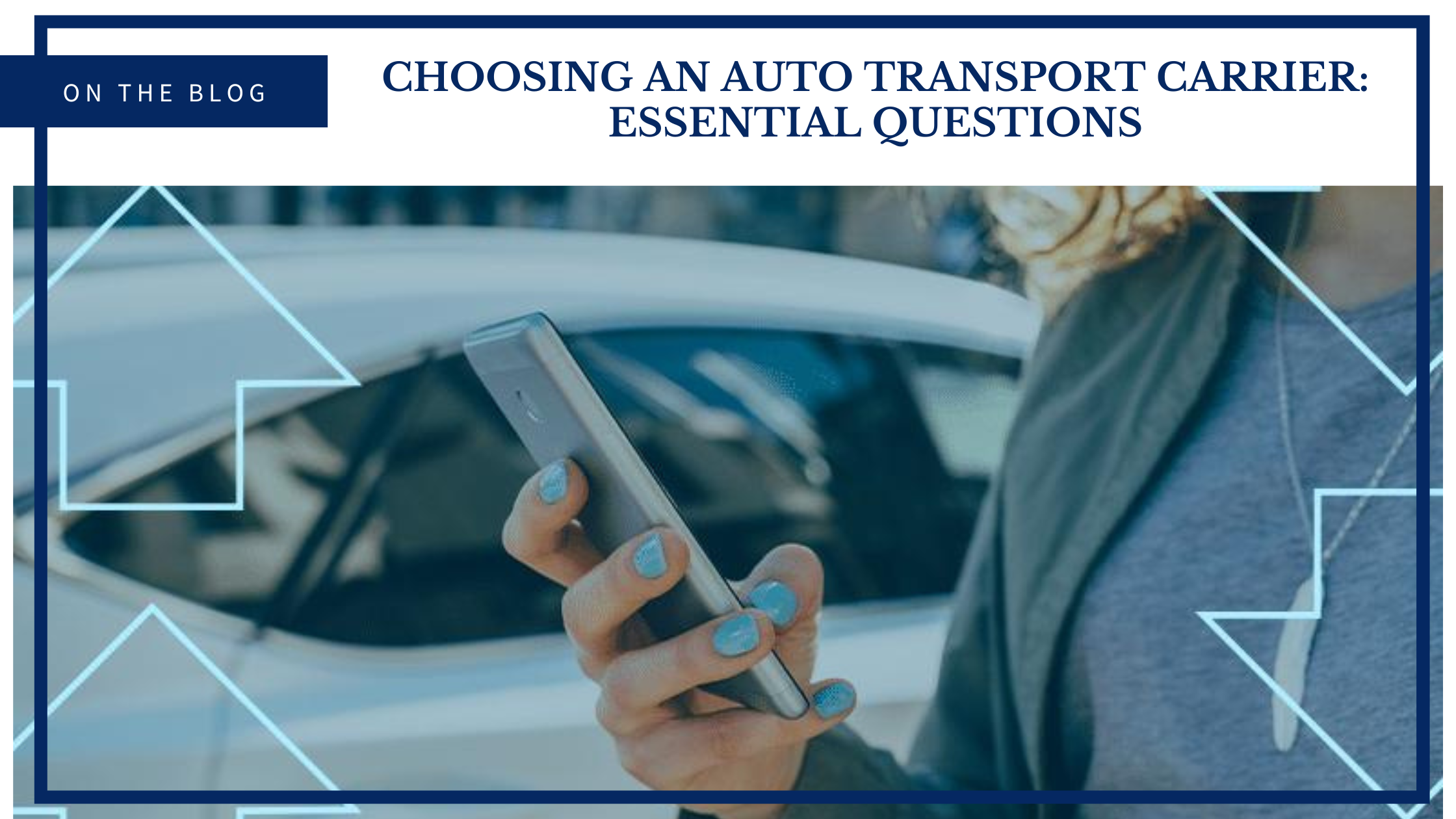
CHOOSING AN AUTO TRANSPORT CARRIER: ESSENTIAL QUESTIONS TO ASK
Shipping your vehicle across the country can be complicated. To make sure your vehicle arrives safely and on time, you’ll need to choose the right auto transport carrier for your unique shipping needs. The good news? Whether you’re a seasoned shipper or getting quotes from carriers for the first time, we’re here to help you take the next step with confidence.
In this guide, we’ll dive into the top criteria for selecting an auto transport carrier. From checking a carrier’s safety record to understanding the types of trailers offered, we’ll cover the best practices for identifying reputable providers that provide secure transport you can trust.
If securing worry-free auto shipping is your top priority, read on for expert advice on asking the right questions, getting binding quotes, and avoiding common pitfalls when hiring an auto transport carrier this moving season.
EVALUATING YEARS OF EXPERIENCE AND SHIPPING SPECIALIZATION
When selecting an auto transport carrier, their years of experience and specialization in shipping vehicles should be two of your top evaluation criteria. This helps avoid amateur operations and ensures expertise in safely handling your specific type of vehicle.
INQUIRING ABOUT YEARS OF EXPERIENCE
When you’re researching potential carriers, take the time to ask them how long they’ve been shipping vehicles. For a secure and seamless shipping experience, you’ll want to confirm an established history specifically focused on transporting cars, trucks, SUVs, and other auto shipments.
This level of experience managing the unique requirements of vehicles indicates seasoned providers that have robust protocols, well-trained drivers, and reliable processes in place tailored for secure auto transport. Compared to newer providers who might still be developing program fundamentals, carriers with longevity demonstrate the systems, equipment, and employee skills crucial for meeting such specialized shipping needs across years of service.
SPECIALIZATION IN DIFFERENT TYPES OF SHIPMENTS
In addition to overall experience shipping vehicles, specialized auto carriers should also have proven expertise aligned with your specific type of vehicle. That often means providing enclosed trailers and white-glove loading assistance for classic and vintage cars.
Outsized trucks, RVs, and buses require carriers with appropriate trailer sizes that can fully accommodate larger vehicles. Here, confirming that carriers have experience moving assets of similar scale helps provide the peace of mind that they can securely ship yours.
Carriers handling hybrid and electric models should explicitly confirm familiarity with their unique battery safety protocols. Even recreational vehicles like ATVs or golf carts can have custom securement needs that specialty carriers are accustomed to managing.
When it comes to specialization, it’s essential to not only pay attention to general experience but also specialized expertise transporting vehicles precisely like yours. Ask targeted questions to ensure the auto transport carrier has demonstrated alignment of equipment, processes, and driver expertise tied to your shipment type. This provides the confidence that your asset’s handling needs will be fully met.
QUESTIONS TO ASK AN AUTO TRANSPORT CARRIER ABOUT THEIR EXPERIENCE
- How many years have you specialized solely in auto transport?
- What percentage of your shipments focus on vehicles versus other freight?
- What equipment do you use to correctly ship (classic cars, oversized trucks, etc.)?
- Are your drivers required to have specialty training for eco-friendly/hybrid vehicle transport?
VALIDATING LICENSES AND ENSURING ADEQUATE INSURANCE COVERAGE
A carrier’s credentials in licensing and insurance indicate legitimacy, safety, and options to protect your vehicle under their care. Be sure to vet these areas thoroughly before taking the next step with a potential carrier.
Want extra peace of mind when you ship your vehicle? Learn more about the uShip Protection Plan.
VERIFYING PROPER LICENSING
It’s crucial to validate that any auto transport carrier you consider has proper licensing, including federally registered operating authority and up-to-date state permits required for commercial transport businesses. This information should be displayed on their uShip carrier profile. If you don’t see it, you should ask the carrier to provide proof of licenses, DOT registrations, and other credentials.

DETAILED BREAKDOWN OF SHIPPING COSTS
To avoid sticker shock, secure a guaranteed transport quote upfront that delineates all pricing components, backed by a binding bill of lading. Carefully review the cost breakdown, including the base shipping fee and all potential ancillary charges like taxes, fuel surcharges, and add-on fees for additional services.
Understand how different factors, such as your vehicle’s condition, modifications, or operating status, may also alter the final price. In addition, confirm policies on any change orders or additional stops that could impact final invoice pricing.
PAYMENT TERMS AND CONDITIONS
Establish payment expectations and requirements through a written agreement outlining the initial deposit amount owed, subsequent installment schedule, and final payment deadline (whether due on pickup or delivery).
uShip makes it easy to process these shipping transactions safely and securely. We’ve got several accountability measures in place to do that, including uShip Payments, our three-step payment process that ensures you’re in control of your money until delivery is made.
QUESTIONS TO ASK ABOUT COSTS AND PAYMENT
- What is your guaranteed quote and complete breakdown of all shipping costs?
- Are fuel surcharges, taxes, and other fees locked into quoted pricing or variable?
- Do you offer flexible pricing plans if my drop-off/pick-up time frame changes?
- What discounts are offered for early final payment or referring other customers?
LOCKING IN TRACKING AND DELIVERY PROTOCOLS
Understanding available tracking visibility options and confirmed delivery plans is imperative to prevent unwelcome surprises or issues taking possession of your vehicle. A lack of clarity introduces the risk of delays, coordination problems, and barriers to collecting your vehicle. Fortunately, asking for answers upfront can help mitigate these issues.
AVAILABILITY OF TRACKING OPTIONS
Ask your transporter if they have real-time status updates turned on for uShip shipments. As for explicit confirmation on what automated notification protocols will update you via text, email, etc., if delays arise en route. Insufficient transparency via tracking tools can cloak delays and mask problems.
ESTIMATED DELIVERY TIMELINES AND HANDOFF PROCEDURES
Nail down firm pickup timing, estimated delivery date ranges, and the complete sequences of transport legs and handoffs between them. Ask carriers if they have a contingency solution in place if weather events or other problems extend standard time-of-arrival dates. Additionally, ask for specifics on receiving party requirements, from IDs to paperwork forms necessary to verify your authority for vehicle release upon delivery.
QUESTIONS TO ASK ABOUT TRACKING AND DELIVERY
- Do you have the uShip tracking feature turned on for shipments?
- How soon can you confirm pickup information and timing?
- How many hours/days before estimate delivery do you provide status calls or updates?
- What are your contingency solutions if bad weather or traffic delays delivery to the expected destination?
REVIEWING REPUTABLE AND DIRECT CUSTOMER FEEDBACK
Performing comprehensive reputation due diligence, including analyzing impartial past customer reviews and directly engaging customer references, is pivotal to avoiding auto carriers prone to chronic service problems or vehicle risks—even providers with slick profiles and claims of quality warrant layered scrutiny from unbiased outside sources before commitment.
ACCESSING AND INTERPRETING CARRIER REVIEWS
Conduct broad reputation checks of potential carriers by examining credible watchdog sites for any concerning complaint records. Cross-reference overall presence and ratings on accredited assessment platforms like BBB as well.
Remember: Company-managed profiles or testimonials tend to filter out negative feedback, so push to obtain unfiltered commentary giving a true insight into service issues, damaging incidents, and other red flags you should weigh into hiring decisions.
INVESTIGATING COMPLAINT PROTOCOLS AND DAMAGE CONTROL POLICIES
Even companies with excellent reputations can experience unforeseen incidents during transport, ranging from minor scratches to tragic rollovers. Unfortunately, carriers can be elusive when you’re asking about collision liability and insurance claim specifics after taking possession of your vehicle.
PROCESS FOR HANDLING SHIPPING DISPUTES
The auto transport carrier should utilize formal complaint resolution processes to address billing disputes, delivery coordination failures, and shipment delays. You want the ability to log concerns during and after your vehicle transit for an orderly response.
Make sure escalation protocols exist where needed. For instance, you should be promptly routed to management if frontline representatives prove unsatisfactory in resolving disputes. Swift conflict resolution demonstrates effective internal coordination and focus on maintaining customer satisfaction long after transports are complete.
POLICIES REGARDING DAMAGES AND CLAIMS
Get specifics on how the carrier handles damage liability and insurance claims tied to vehicle condition before and after final delivery. The auto transport carrier should conduct and record detailed condition checks at every transport handoff to help determine fault if damage ultimately occurs. Review damage claim procedures. Are inspectors deployed? What supporting evidence is required? Are there damage cap waivers?
Find out time limits on claim submission and promised payout speeds once approved. Waiting a few weeks for payments proves more reliable than vague commitments. Transparent, responsive damage policies suggest accountability.
Did you purchase a uShip Protection Plan? Let us do the heavy lifting for you.
QUESTIONS TO ASK ABOUT CLAIMS AND DISPUTES
- Do you offer dispute and escalation resolution contacts? Are they easily accessible?
- How soon after a complaint does management get involved for review and follow-ups?
- What are inspectors’ credentials? Are damage check reports shared on demand?
- What evidence do I need to submit if vehicle damage occurred during shipment?
- What recourse exists if I miss your claim submission deadline unintentionally?
- Should I be aware of damage cost liability limits or waivers?
CHOOSE USHIP FOR SEAMLESS, STRESS-FREE SHIPPING
It takes time, effort, and research to choose an auto transport carrier that meets your shipping needs. While no carrier can guarantee perfect service, asking the right questions upfront helps reduce your risk. It also helps you avoid amateur carriers who are only looking for quick business, showing which carriers genuinely focus on customer satisfaction from start to finish.
Don’t just scan websites—marketing is designed to impress! Dig deeper through policy reviews, industry record checks, and past client outreach to determine dependability. Carriers should openly provide references, welcome inquiries, and deliver straight answers.
Looking for a reliable carrier? We’ve got you covered. With uShip’s extensive network of top-notch carriers and user-friendly platform, we make finding the perfect auto transport carrier a breeze. Trust uShip to connect you with professionals who will ensure your shipment arrives safely and on time.
FREQUENTLY ASKED QUESTIONS (FAQS)
What should I know about a carrier’s insurance policy?
Ask carriers to furnish complete insurance documentation outlining cargo coverage amounts, exclusions, requirements, and supplemental options to review whether adequate protection for your vehicle’s value exists. For added peace of mind, consider purchasing a uShip Protection Plan.
How do I verify a carrier’s license and qualifications?
Search for DOT operating authority and state business licenses on their uShip profile or via public records.
What are the signs of a reliable shipping solution?
Years of auto transport experience, specialty experience with your vehicle type, cargo/liability insurance adequacy, accessible online tracking tools, and realistic pricing all help signal dependable service.
How can I track my shipment?
Most carriers provide access to real-time monitoring and status updates via the uShip app. You can also directly communicate with your carrier for the most up to date info.
How should I handle a dispute with an auto transport carrier?
Carriers should furnish accessible contacts for prompt complaints filing, provide the next steps on dispute review timing, and escalate unresolved issues to management upon request until satisfactory conflict resolution is achieved. Most service providers offer 30 days for raising issues identified post-shipment related to failures or damages. Purchase a uShip Protection Plan? Let us do the heavy lifting for you.

